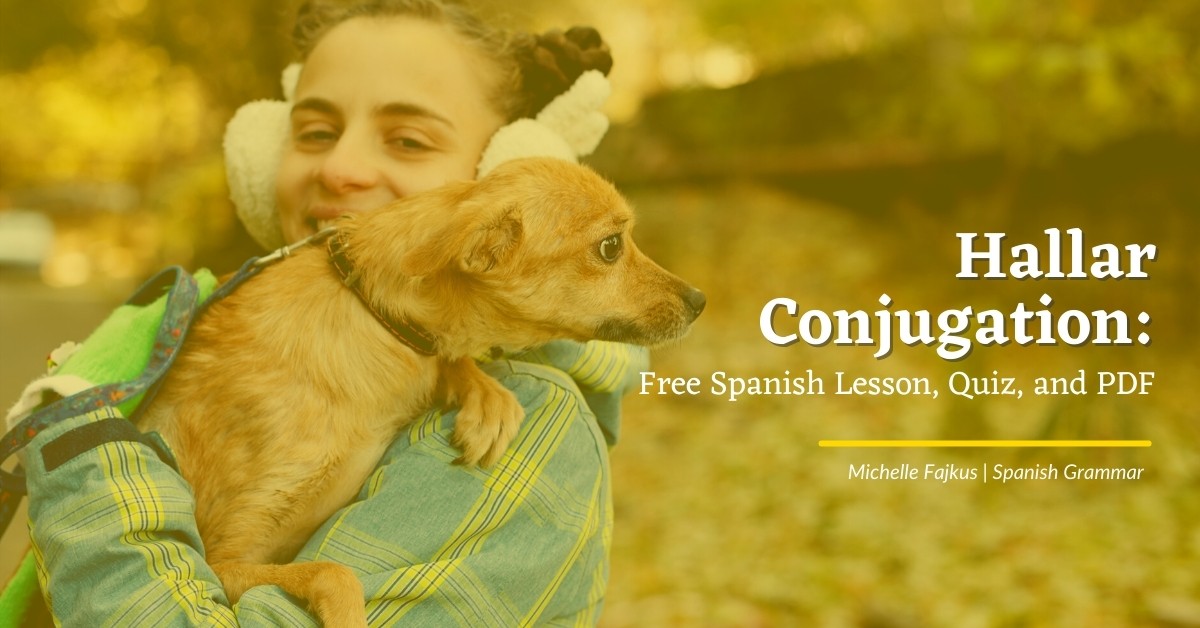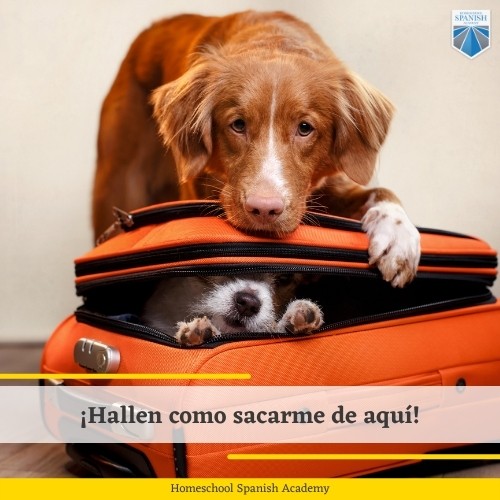
Hallar Conjugation: Free Spanish Lesson, Quiz, and PDF
Do you want to discover the ins and outs of hallar conjugation?
Hallar is a regular Spanish -AR verb that means “to find,” or “to discover.” Its numerous related translations in English include
- To find out
- To encounter
- To locate
- To find out about
- To detect
Today, we’ll take a close look at hallar conjugation and learn multiple forms, encompassing three moods:
- Indicative (present, past, conditional, and future)
- Subjunctive (present and past)
- Imperative
The Ultimate Guide to Hallar Conjugation
Because this is a complete guide to hallar conjugation, you may not be familiar with all the tenses and forms shown. However, with consistent practice, you’ll soon be an expert at using Spanish verbs.
Be sure to try out your fresh hallar conjugation skills with the quiz later in this article!
Download our Free “Hallar Conjugation” PDF!
Just type in your name and email and we will immediately send the PDF to your inbox!
Hallar Conjugation: Verbals
For our first hallar conjugations, you need to learn the following two verb forms:
- Conjugation of haber + past participle of hallar
- Conjugation of estar + gerund form of hallar
The infinitive form of the verb is hallar.
The past participle of hallar is hallado.
The gerund form of hallar is hallando.
These compound tenses involve using the helping verbs haber and estar. The conjugation changes in these tenses happen within the helping verbs, while the form of hallar stays the same.
Let’s see them in action:
Necesitamos hallar una salida juntos.
We need to find the way out together.
El país ha hallado una solución.
The country has found a solution.
Hallando graciosa la situación, Alfredo salió del cuarto y caminó por la casa.
Finding the situation funny, Alfredo left the room and walked around the house.
A common saying using the verb hallarse is
Hallarse en el pellejo de otro.
To be in someone else’s shoes.
Hallar Conjugation: Indicative Mood
| Yo | hallo |
| Tú | hallas |
| Él, ella, usted | halla |
| Nosotros | hallamos |
| Ellos, ellas, ustedes | hallan |
Ella halla a su amiga en la tienda.
She finds her friend in the store.
¿En qué situación nos hallamos?
What kind of a situation do we find ourselves in?
¿Dónde se hallan nuestras oportunidades?
Where do our opportunities lie?
| Yo | hallé |
| Tú | hallaste |
| Él, ella, usted | halló |
| Nosotros | hallamos |
| Ellos, ellas, ustedes | hallaron |
Ayer mi hermana halló un perro y lo tiene todavía.
Yesterday my sister found a dog and she still has it.
¿Hallaste la tela para el pantalón?
Did you find the fabric for the pants?
Estuve investigando y creo que hallé algo.
I’ve been researching, and I think I found something.
| Yo | hallaba |
| Tú | hallabas |
| Él, ella, usted | hallaba |
| Nosotros | hallabamos |
| Ellos, ellas, ustedes | hallan |
Nadie la hallaba.
No one found her.
Juan hallaba en el bosque su escuela y su santuario.
Juan found his school and sanctuary in the forest.
Vine a ver si hallabas los documentos.
Just making sure you could find the documents.
Conditional
| Yo | hallaría |
| Tú | hallarías |
| Él, ella, usted | hallaría |
| Nosotros | hallaríamos |
| Ellos, ellas, ustedes | hallarían |
Estoy convencido de que hallaría esos rasgos en él.
I’m positive that you would find those qualities in him.
La mente se elevaría y el corazón hallaría descanso.
The mind would be uplifted and the heart would find rest.
No pensé que hallaríamos una solución así de rápido.
I didn’t think we’d find a solution so quickly.
| Yo | hallaré |
| Tú | hallarás |
| Él, ella, usted | hallará |
| Nosotros | hallaremos |
| Ellos, ellas, ustedes | hallarán |
Si está allí, créeme, la hallarán.
If she’s out there, believe me, they’ll find her.
En esta biblioteca hallará una amplia selección de recursos.
In this library, you will find a wide selection of resources.
Hallar Conjugation: Subjunctive Mood
We use the subjunctive mood to talk about hypotheses, hopes, wishes, or uncertainty.
| Yo | halle |
| Tú | halles |
| Él, ella, usted | halle |
| Nosotros | hallemos |
| Ellos, ellas, ustedes | hallen |
Buscar cualquier cosa que se halle fuera de lugar.
Look for anything out of place.
Esperamos que se halle pronto una solución para poner fin al conflicto.
We hope that a solution to end the conflict will be quickly found.
Espero que hallen los mariscos suculentos.
I hope you find the seafood to be succulent.
| Yo | hallara / hallase |
| Tú | hallaras / hallases |
| Él, ella, usted | hallara / hallase |
| Nosotros | halláramos / hallásemos |
| Ellos, ellas, ustedes | hallaran / hallasen |
No quería que él hallara algo inapropiado.
I didn’t want him to find anything inappropriate.
Esperaba que lo hallaras, que te diera respuestas.
I had hoped you would find it, that it would give you some answers.
Espero que Maria hallase lo que buscaba.
I hope Maria found what she was looking for.
Hallar conjugation in the past subjunctive mood can either end in –era or -ese. Both ways are accepted, although -era is more common and informal. When writing a formal letter, I suggest you use the verb ending -ese. This also applies to the next tense.
Past Perfect Subjunctive
| Yo | hubiera / hubiese + hallado |
| Tú | hubieras / hubieses + hallado |
| Él, ella, usted | hubiera / hubiese + hallado |
| Nosotros | hubiéramos / hubiésemos + hallado |
| Ellos, ellas, ustedes | hubieran / hubiesen + hallado |
For the past perfect subjunctive tense, we use the auxiliary verb haber and the past participle of hallar.
Mi padre hubiera hallado una forma de sortearlo.
My father could have found a way around this.
Ojalá hubiera hallado un modo de decírtelo.
I wish I could have found a way to tell you.
Su abuela hubiese hallado un modo de hacerlo.
Her grandmother would have found a way.
Present Perfect Subjunctive
| Yo | haya + hallado |
| Tú | hayas + hallado |
| Él, ella, usted | haya + hallado |
| Nosotros | hayamos + hallado |
| Ellos, ellas, ustedes | hayan + hallado |
For the perfect subjunctive tense we use the auxiliary verb haber and the past participle of hallar.
Es increíble que haya hallado algo ahí.
It’s amazing that I found anything in there.
Quizás te haya hallado una secretaria.
He might have found you a secretary.
(Note: the future subjunctive tense exists is rarely used, so I’m not including it in this lesson.)
Hallar Conjugation: Imperative Mood
The imperative mood is used to give commands. These tenses don’t include most of the subject pronouns since you can’t give commands in the first person singular (yo) or plural (nosotros) or the third person (él, ella, ellos, ellas).
| Affirmative | Negative |
| Halla | No halles |
| Halle | No halle |
| Hallemos | No hallemos |
| Hallen | No hallen |
Busca, pero no halles.
Seek but do not find.
Hallemos una conexión entre estos dos textos.
Let’s find a connection between these two texts.
¡Hallen como sacarme de aquí!
Find me a way out of this place!

Hallar Conjugation Quiz
The best way to solidify your hallar conjugation knowledge is by practicing! Check your understanding by completing the following quiz.
Exercise 1
Identify the tense and pronoun of each hallar conjugation.
1. hallaría
2. hallo
3. hallaste
4. halle
5. hallamos
Exercise 2
Conjugate hallar in the tense given.
1. yo – past simple indicative
2. tú – imperative, negative
3. usted – present simple indicative
4. ellos – conditional indicative
5. nosotros – future simple
Exercise 3
Fill in the blank with the correct form of hallar.
1. Yo _____________ una clave en la calle. (present simple)
2. Tú siempre _____________ los mejores libros. (past imperfect)
3. Elena _____________ los documentos mañana. (future simple)
4. Ojala que Oscar _____________ su pasaporte. (present subjunctive)
5. ¡___________ la verdad! (tú, affirmative imperative)
Exercise 4
Translate the following sentences to English.
1. Espero que halles un lindo apartamento.
2. Tu vecino me dijo que te hallaría aquí.
3. Aquí hallará información sobre nuestros servicios.
4. No puedo creer que me hallaste otra vez.
5. Lo sabría si los hubiéramos hallado.
Click here to see the answer key!
Discover a New Level of Spanish
Congratulations! You’ve just learned a ton about hallar conjugation in Spanish. The next step is to develop a speaking practice to solidify your new knowledge. A wonderful way to make it happen is with one of our native Spanish-speaking teachers from Guatemala. Ask them for tips to help you learn the uses and tenses of Spanish verb conjugation. Engage in real-life conversations today by signing up for a free trial class at Homeschool Spanish Academy!

Ready to learn more Spanish grammar? Check these out!
- 50 Useful Spanish Transition Words for Everyday Speech and Writing
- Master the 18 Spanish Tenses (and Take Our Cheat Sheet With You)
- All About Adverbial Clauses in Spanish
- The Ultimate Guide to the Differences Between ‘Pero’ and ‘Sino’ in Spanish
- A Guide to Double Negatives in Spanish
- Ver Conjugation: Free Spanish Lesson, Exercises, and PDF
- Common Irregular Informal Commands in Spanish
- Dialect vs Accent: Is It a Language, Dialect, or Accent?
Answer Key
Exercise 1
1. yo/él, ella, usted – conditional
2. yo – simple present indicative
3. tú – simple past indicative
4. yo – present subjunctive
5. nosotros – simple present and simple past
Exercise 2
1. hallé
2. no halles
3. halla
4. hallarían
5. hallarémos
Exercise 3
1. hallo
2. hallabas
3. hallará
4. halle
5. halla
Exercise 4
1. I hope you find a nice apartment.
2. Your neighbor told me I could find you here.
3. Here you will find information about our services.
4. I can’t believe you found me again.
5. You would’ve heard if we had found them.
- Ver Conjugation: Free Spanish Lesson, Exercises, and PDF - December 5, 2024
- What Are the Different Levels of Language Proficiency? - October 17, 2024
- Master All the Forms of Ser in Spanish: Your Ultimate Grammar Guide - July 18, 2024




